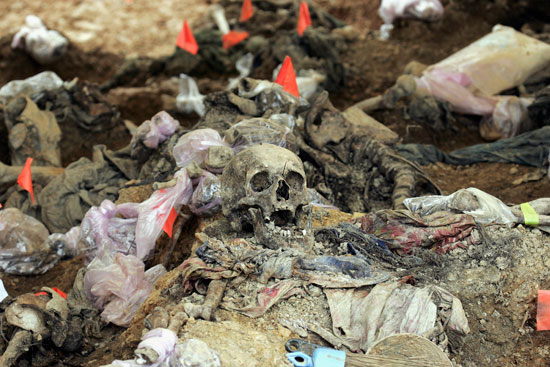Franco ‘Bifo’ Berardi: The Coming Global Civil War: Is There Any Way Out?
This article was originally published Jan 2016 in e-flux.
Necro-Economy
Are we heading into the Third World War? Yes and no: war has been with us for the past fifteen years, it promises to be with us for a long time, and it threatens to destroy the last remnants of modern civilization. The exacerbation of xenophobia across the West and the rise of nationalism in countries like France are causes and effects of a looming war whose sources lie in the past two hundred years of colonial impoverishment and humiliation of the majority of the world population, not to mention neoliberal competition and the privatization of everything—including war itself.
Pacifism is becoming irrelevant as the conditions of war become irreversible. How can we oppose war when killers shoot at a peaceful crowd at a concert? War is becoming normal: the stock exchange no longer reacts to massacres, as its main concern is the looming stagnation of the world economy. After every armed attack, whether by Islamists or white supremacists, by random murderers or by well-trained fundamentalist killers, Americans run to buy more weapons. So weapons are not only increasing in the arsenals of nations, but also in the kitchens and bedrooms of everyday families.
A Republican assemblywoman from Nevada named Michele Fiore recently posted a Christmas family portrait on Facebook. At first glance, it’s like any other holiday card, with three generations of a family in red shirts and jeans in front of a Christmas tree. Upon closer inspection, you see that Mrs. Fiore, her adult daughters, their husbands, and even one of her grandchildren are all holding firearms.
The privatization of war is an obvious feature of neoliberal deregulation, and the same paradigm has generated Halliburton and the Sinaloa Cartel, Blackwater and Daesh. The business of violence is one of the main branches of the global economy and financial abstraction does not discriminate criminal money from any other kind.
The process of externalization and privatization is now provoking a worldwide civil war that is feeding itself. According to Nicholas Kristof, “in the last four years more people have died in the United States from guns (including suicides and accidents) than Americans died in the wars in Korea, Vietnam, Afghanistan and Iraq combined.”1

Michele Fiore, a Republican assemblywoman from Nevada, poses with her family for her Christmas card, 2015.
Global Fragmentary Civil War
Are we heading toward a global war? Not exactly: no declarations of war are being issued, but innumerable combat zones are proliferating. No unified fronts are in sight, but fragmented micro-conflicts and uncanny alliances with no general strategic vision abound. “World war” is not the term for this. I would call it fragmentary global civil war.
And the fragments are not converging, because war is everywhere.
Now, as US Defense Secretary Ashton Carter claims, “destructive power of greater and greater magnitude falls into the hands of smaller and smaller groups of human beings.”2
When war is privatized, no geopolitical order in the world can be imagined, no arrangement among the conflicting religious tribes can be pursued. No beginning and no end—an endless war, as Bin Laden promised. From the Paradise in which he certainly dwells, Mr. bin Laden must be looking upon the rise of the Caliphate of Death with a smile: so far, he can easily claim that the Army of Allah is winning the war.
Some American Republicans claim that the killings are related to mental illness. In a way, they are right. But they misunderstand the causes and the extent of what they label mental illness. Mental illness is not the rare malady of an isolated dropout, but the widespread consequence of panic, depression, precariousness, and humiliation: these are the sources of the contemporary global fragmentary war, and they are spreading everywhere, rooted in the legacy of colonialism and in the frenzy of daily competition.
Neoliberal deregulation has opened the way to a regime of worldwide necro-economy: the all-encompassing law of competition has canceled out moral prescriptions and legal regulations. Since its earliest phases, Thatcher’s neoliberal philosophy prescribed war among individuals. Hobbes, Darwin, and Hayek have all been summoned to conceptualize the end of social civilization, the end of peace.
Forget about the religious or ideological labels of the agents of massive violence, and look at their true nature. Take the Sinaloa Cartel and Daesh and compare them to Blackwater and Exxon Mobil. They have much more in common than you may think. Their common goal is to extract the maximum amount of money from their investments in the most exciting products of the contemporary economy: terror, horror, and death. Necro-capitalism is the emerging economic order of the world.
The narco business is a pillar of the Mexican economy, and in fact the head of the Sinaloa Cartel, Joaquín “El Chapo” Guzmán, was listed by Fortune magazine as one of the most prominent businessmen of 2012. Why not? After all, he is just a neoliberal entrepreneur who deals in deregulated kidnappings, drug trafficking, and murder.

Between 2009 and 2011, Forbes ranked “El Chapo,” head the Sinaloa drug cartel, the second most powerful man in Mexico, and respectively the 41st, 60th, and 55th most powerful man in the world.
Like neoliberal corporations investing money in the ultimate business, the Iraqi-Syrian caliphate and the Mexican narco army pay salaries to their soldiers, who are necro-proletarians. The narco business recruits unemployed young men from Monterrey, Sinaloa, and Veracruz. The caliphate recruits young men from the suburbs of London, Cairo, Tunis, and Paris, then trains them to kidnap and slaughter people at random. Daesh salaries have been estimated to be as much as one thousand US dollars a month. The group acquires this money from ransom, oil, and taxes imposed on millions of Sunni people. They deliver a postmodern medievalism, but one that is not at all backwards. On the contrary, it is an anticipation of the future.
In a video released by Dubiq, the advertising agency of the Islamic State, the rhetoric is the same as any other type of advertising: buy this product and you’ll be happy.3 Multiple camera angles, slick graphics, slow motion, and even artificial wind give the whole thing a more dramatic mood: join the cause and you’ll find friends, warmth, and well-being. Jihad is the best therapy for depression.
A message for feeble-minded people, for suffering people craving warmth, virile friendship, belonging. Not so different from the ads that we see every day in our city streets, only more sincere when it comes to the subject of suicide. Suicide is crucial in this video: 6,500 current or former US military soldiers commit suicide each year, according to Dubiq. While Americans die alone in anger and despair, God’s soldiers die eager to meet some seventy virgins waiting in Paradise to fuck the warriors.
A Blueprint for Europe and the World
Do you remember Yugoslavia? For some time, it was a rather healthy federation of twenty-five million people. Different ethnic and religious communities coexisted, factories were managed by workers, everybody had a privately owned house, and nobody suffered from hunger. Then came the International Monetary Fund, the Polish pope pushing Croatians into religious war against the Orthodox Serbs, and Germany delivering weapons to the fascist Ustaša.
In 1990, the United States cut off all forms of credit to Yugoslavia unless separate elections were held in each state of the federation within six months. As a consequence, Yugoslavia—no longer able to conduct foreign trade—was condemned to commercial bankruptcy, which reinforced the divisive tendencies of its states. The US then funded the individual states to dissolve the federation, also supporting parties and movements that promoted this process. Meanwhile, Germany shipped arms to Slovenia, Croatia, Bosnia, and Herzegovina.
In March of 1991, fascist organizations in Croatia called for the overthrow of the Socialist government and the expulsion of all Serbs from Croatia. On March 5, 1991, they attacked the federal army base at Gospić, and civil war began.
The extreme right-wing Croatian party Democratic Union, which used the flag, emblems, and slogans of the pro-Nazi Ustaša party, seized power. Citizenship, property rights, employment, retirement benefits, and passports were granted only to Croats and to no other ethnic group. Thus, 300,000 Serbs armed themselves and entered the fray with unspeakable brutality.
The destruction of Yugoslavia can be seen as a return of Hitler’s ghost to the world scene. Ethnic-religious wars caused around 170,000 casualties, as ethnic cleansing was practiced in every area of the federation. After seven years of violence, a new state order emerged based on a paradigm of ethnic-religious identification, a principle thought to have been extinct after the end of the Second World War and the defeat of Nazism.
Twenty years after the Nazi-neoliberal wars of Yugoslavia, in all those small nation-states (except perhaps Slovenia) unemployment is rampant, people are impoverished, schools are privatized, and public infrastructure is in disrepair. Today, the Yugoslavia of the Nineties may well be a blueprint for the European future: German Ordoliberalism has impoverished social life, depleted public services all over the continent, and inflicted humiliation on Syriza which has jeopardized the core of European solidarity.
The failure to deal with the new wave of migrants from the East has exposed the political fragility of the European Union, and now fuels a new outburst of fear, racism, shame, and bad conscience.
From the Balkans to Greece, from Libya to Morocco, are the ten million people amassing at these borders going to be the perpetrators of the next terrorist wave? Or will they be the victims of the next Holocaust?

Forensics experts work on exhuming and identifying Srebrenica victims, Bosnia and Herzegovina, July, 2005. Photo: Marco Di Lauro/Getty Images
The Only Way Out
After the attacks in the center of Paris on Friday, November 13, a nervous French President declared: “The security pact takes precedence over the stability pact. France is at war.”
Bin Laden’s dream has been fulfilled. A small group of fanatics has provoked fragmentary global civil war. Can it be stopped?
In the present condition of perpetual economic stagnation, emerging markets are crumbling, the European Union is paralyzed, the promised economic recovery is elusive, and it is hard to foresee an awakening from this nightmare. The only imaginable way out of this hell is to end financial capitalism, but this does not seem to be at hand.
Nevertheless, this is the only prospect we can pursue in such an obscurantist time: to create solidarity among the bodies of cognitive workers worldwide, and to build a techno-poetic platform for the collaboration of cognitive workers for the liberation of knowledge from both religious and economic dogma.
A fragmented front of nationalist parties is gaining the upper hand: they oppose the euro currency and globalization, and they call for the restoration of national sovereignty. This front has assembled in the governing coalition of Hungary (which includes Nazis and authoritarian nationalists), in the Italian right-wing of Matteo Salvini, in the Polish government, in the anti-European British party UKIP, and in the rightist majority of the Bavarian CSU. This anti-euro front of European forces is converging with Russian nationalism under the authoritarian leadership of Putin and the banner of national populism and unrelenting Islamophobia.
After the humiliation of Syriza, the future of Europe is held captive by the opposition between financial violence and national violence. In order to grasp the dynamic that drives the global civil war, we first have to see the relation between the icy wind of financial abstraction and the reaction of the aggressive body of society separated from its brain.
The icy wind of financial abstraction is instilling in the European soul a sense of desolation that Michel Houellebecq has described in his books. La soumission (Submission) is a novel about the sadness that emerges from the vanishing of collective desire. Submission to the Supreme Entity (be it God or the market) is the source of the present gloom, and the source of the present war.
Globalization has brought about the obliteration of modern universalism: capital flows freely everywhere and the labor market is globally unified, but this has not led to the free circulation of women and men, nor to the affirmation of universal reason in the world. Rather, the opposite is happening: as the intellectual energies of society are captured by the network of financial abstraction, as cognitive labor is subjugated to the abstract law of valorization, and as human communication is transformed into abstract interaction among disembodied digital agents, the social body is detached from the general intellect. The subsumption of the general intellect into the corporate kingdom of abstraction is depriving the living community of intelligence, understanding, and emotion.
And the brainless body reacts—on one side, a huge wave of mental suffering, and on the other side, the much-advertised cure for depression: fanaticism, fascism, and war. And at the end, suicide.
×
NOTES
1 Nicholas Kristof, “On Guns, We’re Not Even Trying,” New York Times, December 5, 2015 →
2 Discussion with Secretary Carter at the John F. Kennedy Jr. Forum, Harvard Institute of Politics, Cambridge, Massachusetts, defense.gov, December 1, 2015 →
Franco Berardi
aka “Bifo,” founder of the famous “Radio Alice” in Bologna and an important figure of the Italian Autonomia Movement, is a writer, media theorist, and media activist. He currently teaches Social History of the Media at the Accademia di Brera, Milan. His last book titled After the Future is published by AKpress.


